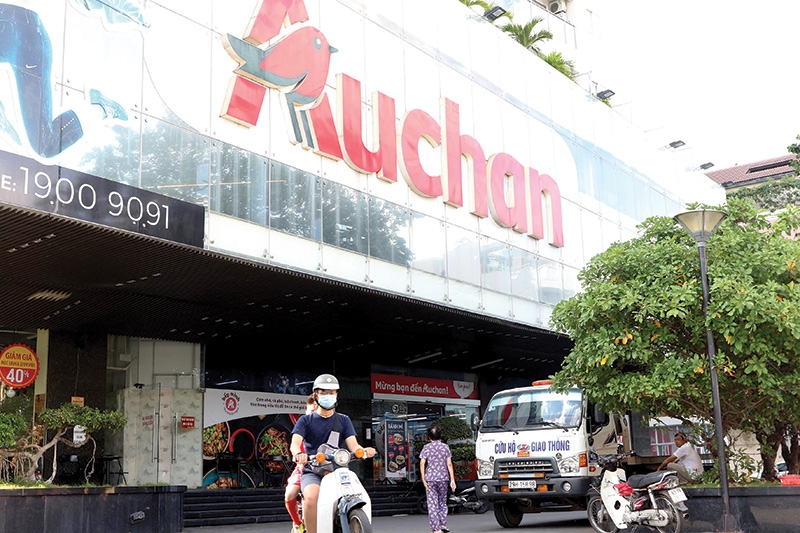Auchan throws in towel over tough competition
 |
| Auchan was the last Western retailer in the country Photo: Le Toan |
French retailer Auchan is selling its portfolio of 18 stores in Vietnam, which currently generate sales of €45 million ($50.25 million). In March, Auchan Retail said it was conducting a review of its loss-making businesses in the Italian and Vietnamese markets where it had faced tough conditions.
Auchan’s exit has attracted the interest of potential buyers. A source familiar with the matter said that the retailer will sell its business to a local corporation but refused to disclose names. The take-over process is slated to start in early June 2019.
According to Le Monde, a French daily afternoon newspaper, Auchan Retail will leave Vietnam before the summer, where it is the last Western distributor. In 2016, German Metro AG wrapped up the sale of its Metro Cash & Carry to TCC Group, while French Casino Group sold Big C Vietnam to Central Group. Both buyers in the two transactions were from Thailand.
When it set foot in Vietnam in 2015, Auchan planned to inject $500 million to open 300 stores. As of present, the retailer has 13 outlets in Ho Chi Minh City, four in Hanoi, and one in the southern province of Tay Ninh. According to an internal source, Auchan pulled out of Vietnam as it has not found the economic model to match the Vietnamese market.
One month ago, convenience store chain Shop&Go also sold off its Vietnamese operations with 87 outlets to conglomerate Vingroup for a symbolic $1. The chain has withdrawn from the market due to stiff competition. There is no doubt that competition in the Vietnamese retail market is becoming intense with the aggressive expansion of both local and foreign retailers, forcing retailers to leave. The market will become more consolidated with stronger players.
Most recently, Vingroup, the parent of VinCommerce, has scooped up $1 billion from South Korea’s SK Group. Accordingly, SK Group has agreed to purchase 154.3 million shares of Vingroup through a private placement, and 51.4 million shares of its VinCommerce unit at VND113,000 ($4.9) apiece. Following the transaction, SK Group will become the largest overseas shareholder in Vingroup. The two conglomerates said they will explore investment opportunities in Vietnam and the region, including jointly conducting M&A.
It is clear that the M&A deals will consolidate the Vietnamese retail market and change the competition landscape in the coming time.
Ralf Matthaes, managing director of technology-driven market research firm Infocus Mekong Research, told VIR that in most developed economies globally, the more developed they are, the fewer the players and the more giants there are. This is a good example of the evolution of Vietnam into a more developed market. Indeed, there has been a huge turnover in terms of M&A over the past three years with the aforementioned VinCommerce, as well as Big C and Metro Cash & Carry, so the playing field is a little more limited than before.
“However, with the growth of e-commerce, it is almost certain that there will be more activity, specifically with either traditional retailers buying into existing e-commerce platforms or new foreign entrants looking to expedite their growth. Interestingly, this will not just be limited to retail but will affect insurance, banking, and other services-oriented industries, as the process and payment elements of e-commerce are similar at their core,” Matthaes said.
On the same note, Yee Chung Seck, partner of Baker McKenzie Vietnam, said that in 2017, around 44 per cent of the total value of M&A activities were derived from the consumer goods and retail sector, which indicates that this is an area that remains attractive to investors. In 2018, the overall volume of M&A deals was lower, but the sector continued to lead.
Specifically, convenience stores and mini-marts in Vietnam remain one of the fastest growing segments, and Baker McKenzie Vietnam expects to see continued investment in this segment. News of foreign retailers such as Lotte Mart and FamilyMart planning to expand and opening up more stores by 2020 have been common.
“The growing middle-class, higher disposable income, and demand for quality goods and services, in particular, were seen to be beneficial to health and wellness, which means that we also expect to see more investment to serve this market,” he added.
What the stars mean:
★ Poor ★ ★ Promising ★★★ Good ★★★★ Very good ★★★★★ Exceptional
 Tag:
Tag:
Related Contents
Latest News
More News
- KKR and Singtel step up data centre investment in Southeast Asia (February 06, 2026 | 13:09)
- New rules ease foreign access to Vietnam equities (February 05, 2026 | 17:29)
- Vietnam’s IFC creates bigger stage for M&As (February 01, 2026 | 08:16)
- Game startup Panthera raises $1.5 million in seed funding (January 29, 2026 | 15:13)
- Cool Japan Fund transfers shares of CLK Cold Storage (January 28, 2026 | 17:16)
- Nissha acquires majority stake in Vietnam medical device maker (January 26, 2026 | 15:40)
- BJC to spend $723 million acquiring MM Mega Market Vietnam (January 22, 2026 | 20:29)
- NamiTech raises $4 million in funding (January 20, 2026 | 16:33)
- Livzon subsidiary seeks control of Imexpharm (January 17, 2026 | 15:54)
- Consumer deals drive Vietnam’s M&A rebound in December (January 16, 2026 | 16:08)




















 Mobile Version
Mobile Version